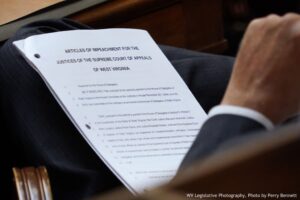- Like
- Digg
- Del
- Tumblr
- VKontakte
- Buffer
- Love This
- Odnoklassniki
- Meneame
- Blogger
- Amazon
- Yahoo Mail
- Gmail
- AOL
- Newsvine
- HackerNews
- Evernote
- MySpace
- Mail.ru
- Viadeo
- Line
- Comments
- Yummly
- SMS
- Viber
- Telegram
- Subscribe
- Skype
- Facebook Messenger
- Kakao
- LiveJournal
- Yammer
- Edgar
- Fintel
- Mix
- Instapaper
- Copy Link
Contact:
Julie Archer, julie@wvoter-owned.org / (304) 610-9094, West Virginia Citizens for Clean Elections
Derek Rosenfeld, derek.rosenfeld@nyu.edu / (646) 292-8381, Brennan Center for Justice
EDITORIAL BOARD ALERT
Amendment No. 1 Would Destroy Checks and Balances in W.V.
Summary
Following reports of lavish spending on office renovations in 2018, West Virginia’s House of Delegates voted to impeach all four sitting justices on the state’s Supreme Court of Appeals. One of the impeached justices, Margaret Workman, filed a lawsuit to stop her impeachment trial, arguing legislators overstepped their constitutional authority. A panel of acting justices agreed, holding the House’s impeachment vote was constitutionally and procedurally flawed, while stressing that its decision had no relevance as to whether the legislature has the power to impeach a justice, a power which is already laid out clearly in Article 4 of the state constitution.
Despite this, West Virginia House of Delegate members claimed, falsely, that they’ve been stripped of their ability to impeach. Enter Constitutional Amendment No. 1. Last year, the House and state Senate successfully passed a joint resolution to create a constitutional amendment which would effectively cut loose future impeachment proceedings of the state legislature from all constitutional restraint. Amendment No. 1 would make it so that no court in the state could intervene to protect the right to a fair hearing of a public official facing impeachment, no matter how frivolous the charge or constitutionally flawed the process. In the hands of a partisan majority, this new power could be abused to oust political opponents without cause, thereby eroding existing checks and balances between the three branches of government and undercutting public trust in the political process.
Fast facts
Write-ups on this and other amendments by outlets like the Charleston Gazette and the Dominion Post have only offered brief summaries of the content of Amendment No. 1 without including context on how it got on the ballot in the first place and the implications it could have on our state democracy.
Other coverage of last year’s joint resolution, which put Amendment No. 1 on the ballot, by outlets like WV Metro News did well to mention the potential abuses of power that this amendment could lead to, but still neglects another key argument against it: namely, that it’s entirely unnecessary. The legislature held and continues to hold sole authority over impeachment proceedings. Here are some fast facts from the Workman decision at the heart of the push to pass Amendment No. 1:
Fact: West Virginia’s constitution permits the legislature to impeach any state official for “maladministration, corruption, incompetency, gross immorality, neglect of duty, or any high crime or misdemeanor.” The legislature has wide latitude in deciding how to conduct impeachment proceedings; however, such proceedings must be conducted “according to law and evidence.”
Fact: The acting court got involved because the House of Delegates did not follow its own impeachment rules, failing to conduct the process according to law and evidence. The House also violated the separation of powers doctrine by citing the Code of Judicial Conduct in several of the impeachment charges against Workman, which is constitutionally regulated by the Supreme Court of Appeals.
Fact: The acting court explicitly made clear that its decision was “not about whether or not a Justice of the Supreme Court of Appeals of West Virginia can or should be impeached,” but rather about the fact that it “must be done correctly and constitutionally with due process.” In other words, the legislature already has the power that backers of the amendment claim to want to restore with Amendment No. 1.
Fact: The acting court expressly held in Workman that the state constitution “does not provide this Court with jurisdiction over an appeal of a final decision by the Court of Impeachment.” In other words, any appeals following a decision made by the Court of Impeachment (i.e., the state Senate) are outside of the jurisdiction of the state Supreme Court of Appeals. Despite this reality, Amendment No. 1 provides, redundantly, that “[no] judgment rendered by the Senate following a trial of impeachment [is] reviewable by any court of this state.”
Fact: The acting court’s decision in Workman that it is appropriate for courts to intervene in unconstitutional impeachment proceedings is not an extreme position. In fact, this position has been endorsed by several U.S. Supreme Court justices. In United States v. Nixon, the U.S. Supreme Court’s only decision addressing the federal constitution’s Senate impeachment clause, former justices Byron White, Harry Blackmun and David Souter agreed that judicial review of unfair impeachment proceedings is acceptable.
Fact: There was an acting court because all of the justices on the state’s Supreme Court of Appeals at the time of Workman’s case were either suspended or had been replaced with acting justices who then recused themselves because they had conflicts of interests that would have made it impossible for them to consider both sides’ arguments with impartiality. Judges should not hear cases where they have an interest in the outcome. That’s why it was appropriate for an acting court to consider former Justice Workman’s petition.
Conclusion
Amendment No. 1 is not needed to restore or protect the legislature’s authority in impeachment proceedings, and would open the door to blatant abuses of power by the legislative branch. Members of the House Judiciary Committee recently raised concerns that, rather than protecting the separation of powers, this amendment would erode the checks and balances between the three branches of government and could be used by future legislatures to punish political rivals without cause.
The people of West Virginia agreed through our constitution that impeachment proceedings must be conducted “according to law and evidence.” The acting court explicitly made clear that its decision in Workman was “not about whether or not a Justice of the Supreme Court of Appeals of West Virginia can or should be impeached,” but rather about the fact that it “must be done correctly and constitutionally with due process.” The only reason the acting court got involved was because the House of Delegates failed to follow its own impeachment rules.
Put plainly, Amendment No. 1 is a dangerous solution in search of a problem. As you move forward with your reporting on the November elections, we ask that you keep in mind the facts related to the acting court’s decision in Workman as well as the potential abuses of power promised by this amendment. Any of the experts listed at the top of this memo would be happy to offer a quote or answer any other questions you may have about Amendment No. 1.











